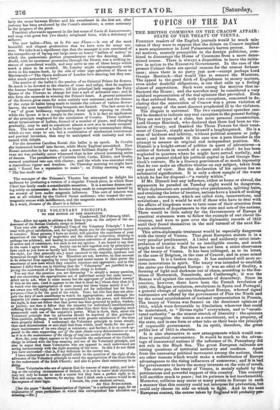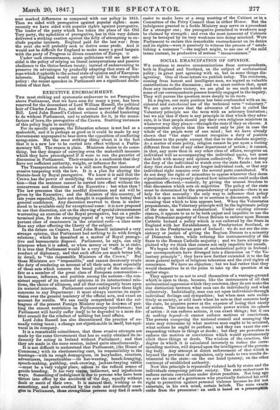TOPICS OF THE DAY
THE BRITISH COMMONS ON THE CRACOW AFFAIR: STATE OF THE TREATY OF VIENNA.
FOREIGN readers of the English journals would be much mis- taken if they were to suppose that the debate on Cracow implied a mere acquiescence in Lord Palmerston's barren protest. Seve- ral motives, scarcely perceptible to the foreign politician, com- bined to discourage the House of Commons from a more deter- mined course. There is always a disposition to leave the initia- tive in action to the Executive Government. In the case of the present Cabinet there are special reasons for the utmost forbear- ance; since there is no party just now—except perhaps Lord George Bentinck—that would like to remove the Ministers. The appeal to the good faith of Englishmen in money matters, even under doubtful obligations, is one that calls up a feeling almost of superstition. Such were among the motives that in- fluenced the House ; and the speeches may be considered a very subdued representation of the real opinions that prevailed. Even in that subdued form, all, with two exceptions, concurred in de- claring that the annexation of Cracow was a gross violation of treaty ; many of the most discreet prophesied ill to the violators.
The disgust is universal. The two exceptional speeches can- not be deemed to indicate any real exception to the general feeling. They are not types of a class, but mere personal eccentricities. Lord George Bentinck, who declared that there had been no vio- lation of treaty, and thanked the Three Powers for their treat- ment of Cracow, simply made himself a laughingstock. He is a man of boldness and activity, without political acumen or judg- ment ; and his escapade in this case was a pure blunder in the attempt to assume an original and independent position. Mr. Disraeli is a knight-errant of politics in quest of adventures--a soldier of fortune in search of a cause and a chief : he has been neglected in quarters where he might have served usefully, and he has at present risked his political capital in Lord George Ben- tinck's venture. He is a literary gentleman of so much ingenuity that he can make an effective treatise on any subject, taken from any point of view. But the declaration of his opinion has no substantial signification. It is only a show sample of the wares which he has for disposal—" a variety within."
If Mr. Disraeli had any influence, either at home or abroad, the arguments be paraded on Tuesday night would be dangerous. While diplomatists are pondering over parchments, splitting hairs, and straining the letter of treaties, nations have a knack of making very rude movements, which are called riots, insurrections, and revolutions ; and it would be well if those who have to deal with the affairs of kingdoms were to turn some of their attention from the documents of departments to the state and acts of the nations. There would be little safety for the Governments of Europe if practical statesmen were to follow the example of our clever lit- terateur, and were to pore over the diplomatic records of 1815 until they found themselves in the mid turmoil of the next Eu- ropean settlement.
This ultra-diplomatic treatment would be especially dangerous with the treaty of Vienna. That great European statute is in a very peculiar predicament. A literal and uniformly strict inter- pretation of treaties would be an intelligible course, and much might be said for it. But there has not been a strict observance of the treaty of Vienna. It has been infringed, as to its letter, in the case of Belgium, in the case of Cracow, and in some minor instances. It is a broken treaty. It has sustained still more se- rious innovations in spirit. The treaty was intended to establish the status quo throughout Europe : it was an edict of finality, a forming of light and darkness out of chaos, according to the doc- trines of Metternich, Nesselrode, and Castlereagh; it was the Roman wall against the encroachments of democracy. Since its erection, however, there have been the French revolution of 1830, the Belgian revolution, revolutions in Spain and Portugal; a general change of opinion throughout Europe, whereof signal testimonies are offered by the government of Pius the Ninth and by the actual establishment of national representation in Prussia. The treaty of Vienna was framed on the dominant opinions of 1815, which were favourable to Absolutism wherever that could be maintained, to "Divine right" everywhere, and to "consti- tuted authority" as the utmost stretch of liberality : the opinions of 1847 recognize the nation as a constituent, not a property, of the state, and in one form or other take as their basis the principle of responsible government. In its spirit, therefore, the great public law of 1815 is obsolete. It is also obstructive to new arrangements which would con- duce to practical convenience. It would be much to the advan- tage of commercial nations if the influence of St. Petersburg did not rule in the Black Sea. The great European railroad's are raising questions of territorial authority and confines. Apart from the unceasing political movement among the nations, there are other reasons which would make a redistribution of Europe advantageous to the rising influences of commerce; and it is bad for governments to have the money interests on the side of revolt. The status quo, the treaty of Vienna, is mainly upheld by the pertinacious and powerful support of this country. This country will sacrifice much to peace; but its patience is not inexhaustible. Moreover, collision may occur at many points in Europe in such a manner that this country could not interpose for prevention, but could only choose its side on which to fight. And in the next European contest, the course taken by England will probably pre- sent marked differences as compared with our policy in 1815. Then we aided with prerogative against popular rights : more recently we have sided with popular rights against prerogative. The leader of the party which has taken the place of the Old Tory party, the upholders of prerogative, has in this very debate delivered a striking caution against the folly of attempting to ex- clude popular interests. England paid for the last war : from the next she will probably seek to derive some profit. And it would not be difficult for England to make many a good bargain with the party of Progress in divers countries of Europe. Iss Under such circumstances, acute politicians will see how sui- cidal is the policy of relying on literal interpretations and passive obedience to the thrice-broken treaty; instead of endeavouring to preserve its advantages by gradually adapting that state of Eu- rope which it upholds to the actual state of opinion and of European interests. England would not actively aid in the retrograde policy : the recent speeches in Parliament are a significant decla- ration of that fact.



























 Previous page
Previous page